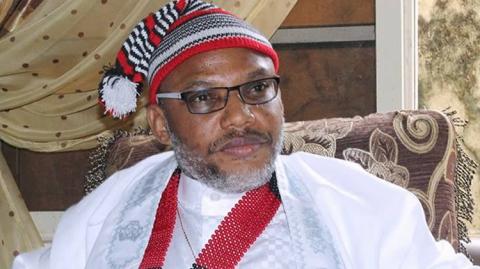
Kanu in the suit he filed through one of his lawyers, Maxwell Opara, before the Federal High Court in Abuja, said preventing him from wearing his preferred attire is tantamount to an infringement on his fundamental human rights.
Nnamdi Kanu, leader of the Indigenous People of Biafra (IPOB), has instituted a fresh suit against the Nigerian government over its refusal to allow him to wear the native Igbo attire, Isi-Agu, for his ongoing trial.
Kanu in the suit he filed through one of his lawyers, Maxwell Opara, before the Federal High Court in Abuja, said preventing him from wearing his preferred attire is tantamount to an infringement on his fundamental human rights.

He accused the Nigerian Government of discriminating against him based on his ethnic group, as other persons on trial were allowed to wear clothes of their choice to court.
Kanu was renditioned to Nigeria from Kenya last June under questionable circumstances. Since his arrival, he has been detained by the Department of State Services (DSS), the secret police of Africa’s most populous nation.
The embattled IPOB leader argued that though he is currently a detainee, he is entitled to the enjoyment of his fundamental right to freedom from discrimination as guaranteed under Section 42(1) of the 1999 Constitution, as amended.
Cited as 1st to 3rd Respondents in the suit marked: FHC/ABJ/CS/482/2022, are the Director-General of the State Security Service (also called DSS), the State Security Service and the Attorney-General of the Federation.
Specifically, Kanu is asking the court to among other things declare “that the Respondents, whilst carrying out their lawful duties, are bound to adhere to and/or respect the fundamental rights of all citizens of Nigeria as enshrined in Chapter 4 of the 1999 Constitution of the Federal Republic of Nigeria as amended and the Africa Charter on Human and Peoples Rights (Ratification and Enforcement) Act.”
He is also seeking an “order directing the Respondents, jointly and severally, to immediately allow the Applicant to have a change of clothes in their detention facility or at any time he appears in public for his trial.
“An order of this court directing the Respondents, jointly or severally, to allow the Applicant to start wearing any clothes of his choice, more so, to allow him to wear his traditional Igbo Attire (Isi-Agu) and/or other Igbo traditional attires of his choice.
“An order of perpetual injunction restraining the Respondents, their authorized agents by whatever name so-called, from further disturbing or interfering with the rights of the Applicant to dignity of human person and freedom from discrimination or in any way infringing on the constitutional rights of the Applicant as guaranteed by law or from making any attempt capable of violating the Applicant’s rights as guaranteed under the Constitution.”
Also, he is praying the court to declare that the Respondents, whilst carrying out their lawful duties, are bound to adhere to and/or respect the fundamental rights of all citizens of Nigeria as enshrined in Chapter 4 of the 1999 Constitution of the Federal Republic of Nigeria as amended and the Africa Charter on Human and Peoples Rights (Ratification and Enforcement) Act.
During a ruling on February 16, Justice Binta Nyako asked Kanu to indicate the type of attire he preferred to wear.
In response, Kanu said: “I want to wear the clothes of my people, ‘Isi Agu’”, a choice the judge turned down.